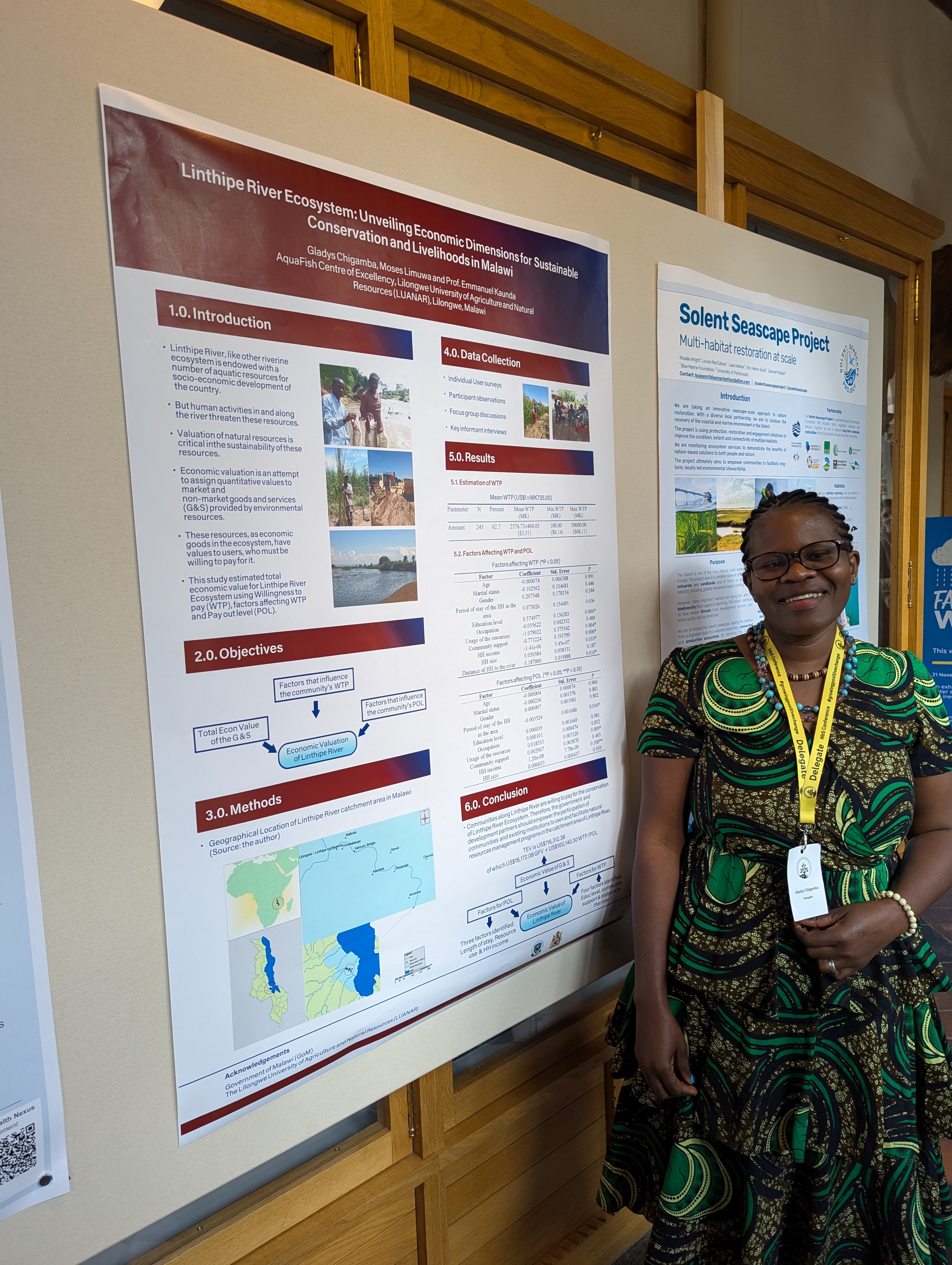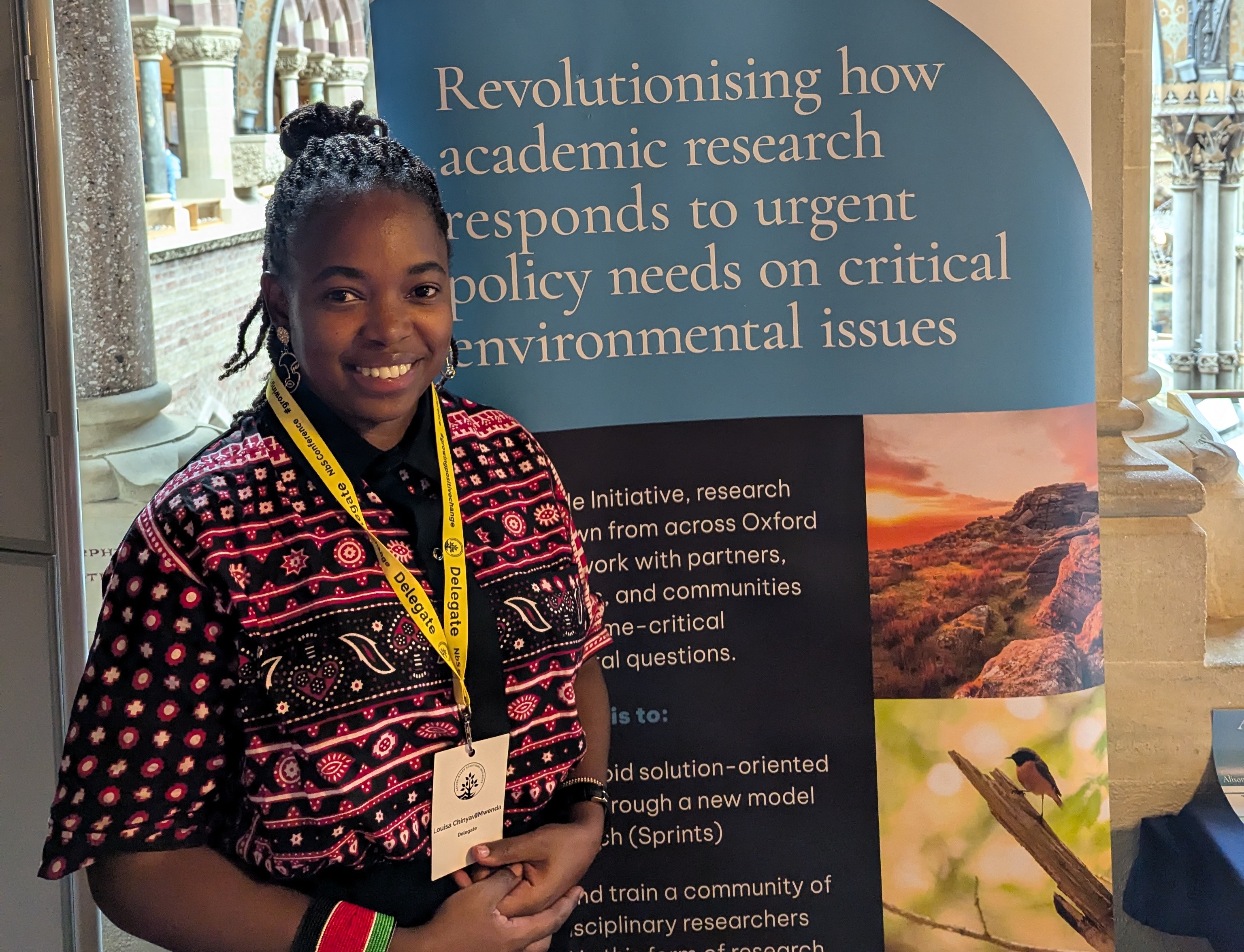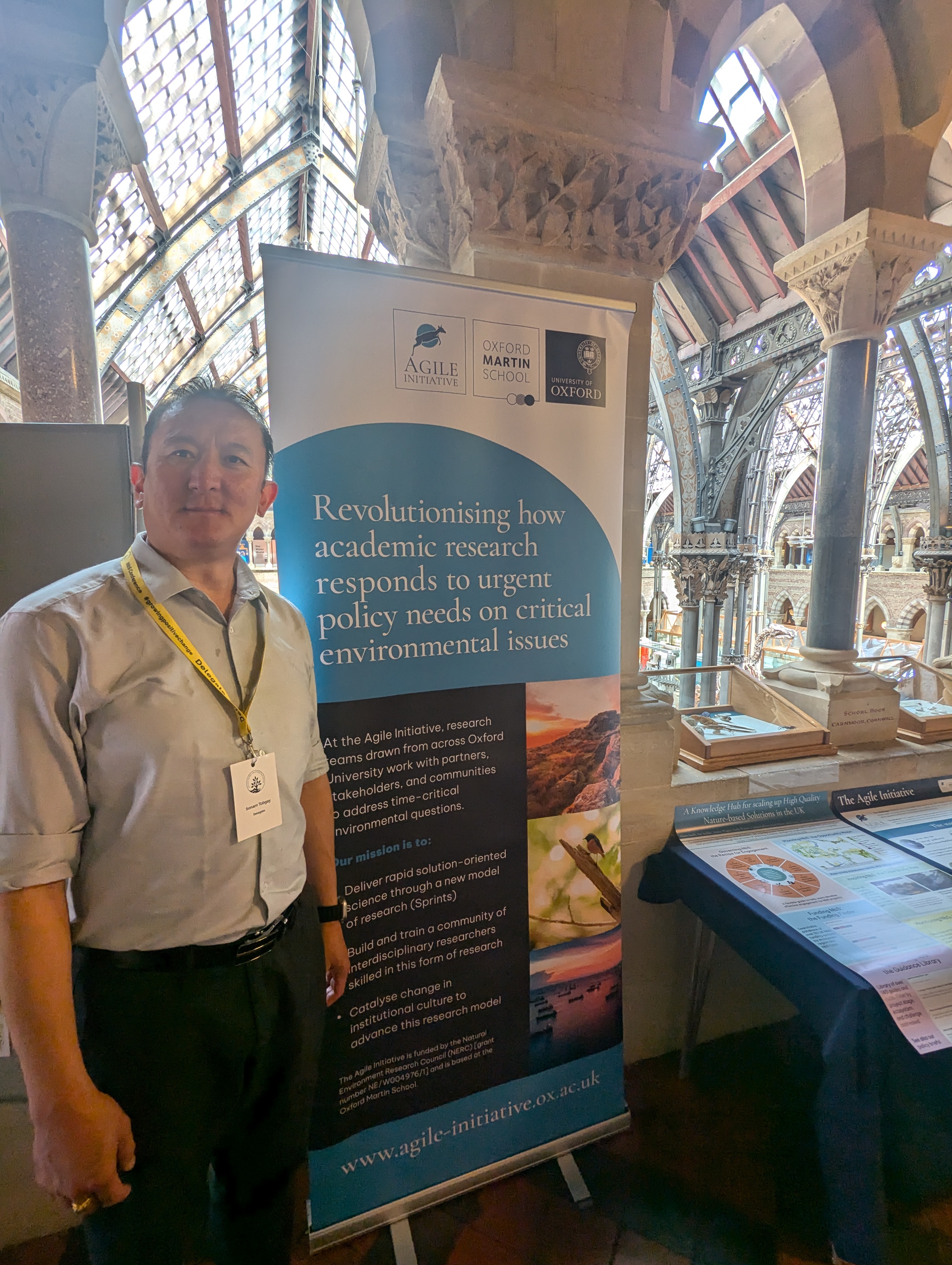Growing Positive Change
Recent News
- Agile at the BES Symposium
- Youth-Led Research and Policy
- Greenhouse gas uncertainties: expanding the impact of research

In June 2024, the Nature-based Solutions Initiative (NbSI) at the University of Oxford held their “Growing Positive Change” conference. The mission of this event was to develop an action agenda for scaling nature-based solutions effectively and ethically so that they can support social-ecological flourishing and promote positive change. The NbSI team brought together interdisciplinary researchers, practitioners, decision makers, and Indigenous people from around the world. In this blog, we hear reflections from three NbS Conference Scholars who attended the event on behalf of the Agile Initiative:
- Gladys Chigamba, the Fisheries Research Officer at the Ministry of Natural Resources and Climate Change, Department of Fisheries, Malawi
- Louisa Chinyavu Mwenda, the Transboundary Water Resources Officer at the State Department for Water, Sanitation and Irrigation, Kenya
- Sonam Togbay, the Chief Forestry Officer at the Forest Resources Planning and Management Division, Government of Bhutan
Gladys Chigamba

The Nature-based Solutions Conference 2024 was a pivotal gathering of experts, Indigenous people, researchers, and students dedicated to nature-based solutions for positive social-environmental change. It was an honor for me to be part of this prestigious platform for discussing innovative policy approaches that prioritize nature-based solutions. The following distils the key policy implications and takeaways from the conference.
- Integrate NbS into Climate Change Mitigation and Adaptation Strategies: Conference speakers and participants emphasized the need for policymakers to recognize the critical role of nature-based solutions in addressing climate change.
- Embed Biodiversity Conservation into Development Planning: The conference highlighted the importance of incorporating biodiversity considerations into development policies and projects. This requires adopting a holistic approach that balances human needs with environmental sustainability.
- Support Community-led Initiatives and Indigenous Knowledge: Policymakers must recognize the vital role of local communities and Indigenous peoples in developing and implementing effective nature-based solutions. Indigenous people are custodians of almost all the biodiversity. This includes supporting community-led initiatives and integrating traditional knowledge into policy decisions.
- Develop Inclusive and Equitable Financing Mechanisms: The conference emphasized the need for innovative financing strategies that prioritize equity and inclusivity. This includes leveraging public and private sector funding and exploring new instruments like green bonds and impact investing.
- Foster International Cooperation and Knowledge Sharing: The global nature of environmental challenges demands enhanced international cooperation and knowledge sharing. Policymakers must prioritize collaboration, capacity building, and technology transfer to accelerate adoption of NbS worldwide.
The NbS Conference marked a crucial step forward in sustainable development and environmental stewardship. As policymakers, we must heed the conference’s call to action and work together to integrate nature-based solutions into our policy frameworks. By doing so, we can unlock the transformative potential of nature-based solutions and create a more resilient, equitable, and sustainable future for all.
Recommendations to policymakers:
- Policymakers should establish a dedicated task force to develop and implement nature-based solution policies.
- Governments and international organizations should increase funding for nature-based solution initiatives, research and restoration of ecosystems.
- Private sector entities should be encouraged to invest in nature-based solution projects and technologies.
- Civil society organizations and local communities should be involved in policy decision-making to ensure inclusive and equitable outcomes.
- Governments should build connected interventions among nature, climate and economy.
Louisa Chinyavu Mwenda

As an environmental expert, understanding nature-based solutions is paramount to leverage strategies that utilize nature and natural processes for multiple benefits for people and the environment. On a quest to understand the power of nature to address global environmental challenges, thanks to The Agile Initiative and the Nature-Based Solutions Initiative of The University of Oxford, I participated in impactful discussions on scaling nature-based solutions effectively to promote positive change at the #NbSConferenceOxford which took place at the Oxford University Museum of Natural History.
The Conference kicked off with a cultural ceremony, setting an ambience that promoted the integration of culture and nature, alongside values of peace and love. In partnership with various stakeholders from the nature, science and cultural sectors, the Conference provided a platform to co-create an action plan for nature-based solutions at local, regional and global scales by tackling different roles in #NbS.
With 9 different captivating sessions, it was fascinating to explore the intricate relationship between nature, science and culture which allowed for a holistic approach towards addressing complex social, economic, cultural and environmental issues by considering scientific and indigenous knowledge alongside cultural practices and values. These rich discussions focused on enhancing the effectiveness and long-term success of #NbS initiatives for example through incorporating cultural perspectives into policy development to ensure that solutions are culturally relevant and acceptable to local communities. Furthermore, speakers representing the scientific sector emphasized the need to formulate policies informed by scientific research so as to ensure that #NbS projects are ecologically sound.
The Conference was centered on diverse themes offering transformative and progressive perspectives on the potential of nature-based solutions. Themes focusing on integrity, health and well-being highlighted how crucial it is to include these fundamental aspects into the planning and implementation of #NbS projects leading to more effective collaboration and sustainable development strategies and outcomes. It was evident that by harnessing the inherent capabilities of ecosystems, #NbS provide innovative strategies that promote sustainability, enhancing ecosystem services and empowering communities to effectively adapt to changing conditions. Discussions around humanitarian crises and uncertainties highlighted the need for policymakers to integrate nature-based solutions into existing policy frameworks related to building resilience such as in climate change adaptation, disaster risk reduction and biodiversity conservation.
In the context of governance, markets and finance for nature, speakers emphasized the importance of governance frameworks to establish clear roles and responsibilities for different actors involved in the planning, implementation, and monitoring of #NbS projects. For this reason, it was recognized that it is essential for coherence between different policy areas to ensure that nature-based solutions are effectively integrated into national strategies and action plans. Consequently, participants were urged to collaborate with diverse stakeholders to build capacity on #NbS to design, implement and track the effectiveness nature-based solutions. Policymakers were encouraged to mainstream nature-based solutions across various sectors and to provide incentives to encourage the adoption of these solutions by communities and businesses, especially towards redefining economic models.
In conclusion, engaging with various participants in stimulating conversations on good practice nature-based solutions recognized the interdependency of sectors towards collaboratively sustaining ecosystems and thus the #NbSConferenceOxford demonstrated that incorporating #NbS offer a promising pathway towards significantly addressing pressing global challenges towards #growingpositivechange.
Sonam Togbay

The Nature-based Solutions (NbS) Conference 2024 was not merely an academic gathering but a profound journey into redefining our relationship with nature and each other. From the very outset, as ceremonial rituals invoking “mother nature” embraced us, it became evident that this was not just another conference but a convergence of minds and spirits from around the globe.
At its core, the conference underscored the imperative of balancing short-term human needs with the long-term health of our ecosystems. This necessitates collaborative efforts with local Indigenous communities whose intrinsic connection to the land offers invaluable insights into sustainable practices. Their stewardship embodies a holistic approach that integrates ecological, economic, and social dimensions—an ethos we must embrace to secure a harmonious future for all.
Throughout the sessions, my convictions about humanity’s role in ecology were profoundly challenged by the insights shared by global experts. Discussions on avoiding greenwashing and integrating Nature-based Solutions into sustainable practices resonated deeply with my ongoing work. The exchanges with esteemed colleagues like Kamana Beamer illuminated practical strategies and pitfalls in navigating the science-policy nexus, crucial for effective conservation and sustainable forest management in my country.
I am now more convinced than ever that a synergy of local knowledge, science, and technology holds the key to delivering tangible benefits to communities while safeguarding biodiversity. Amidst escalating competition for land and resources, this approach not only defends nature but also fosters social and economic resilience.
Looking ahead, I am hopeful for more conferences that emulate this boldness and inclusivity. Organizers who go the extra mile to foster genuine connections among participants and deepen our understanding of socio-ecological systems are catalysts for transformative change. Such gatherings are essential as we strive towards a future where humanity thrives in harmony with a flourishing natural world.
The conference illustrated a pivotal shift needed in Western paradigms of value, urging us to draw inspiration from Indigenous practices that have sustained environments for millennia. Their proven sustainability offers a compelling model for reimagining our relationship with nature—one that is respectful, reciprocal, and enduring.
In conclusion, the NbS Conference 2024 was not just a conference; it was a call to action. It challenged us to transcend boundaries—geographical, disciplinary, and cultural—in pursuit of a shared vision: a future where human prosperity flourishes in harmony with thriving ecosystems.


